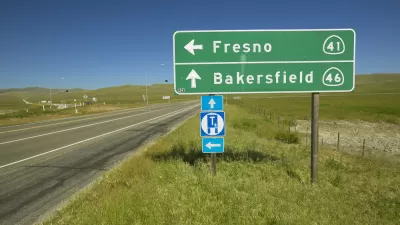As we reported last week, the central question facing the Board of Supervisors was how could they approve a project that appeared to violate a regional sustainability plan - one that they voted for as MPO members? They did - by a 4-1 vote.
The sprawling, 2,700-acre greenfield development called Cordova Hills and its potential conflict with the Metropolitan Transportation Plan/ Sustainable Communities Strategy, the regional plan that complies with with a state law designed to reduce greenhouse gas emissions stemming from vehicle emissions - tied in part to land use descisions, was described here on Jan. 25. Cordova Hills is expected to bring 8,700 housing units to exurban Sacramento County.
Brad Branan provides a postscript to the Jan. 29 meeting. The day before the vote, the supervisors received a letter from SB 375 author Sen. Darrell Steinberg, stating: "To achieve the state's greenhouse gas reduction goals, significant greenhouse gas reductions from both changed land use patterns and improved transportation are critical."
About 30 people spoke to the board about the project, most of them in opposition. The board chambers were full of red signs saying "Just Say No! Sprawl Hurts Us All!"
The project received support from business and construction groups, such as the Sacramento Metro Chamber, while drawing opposition from environmentalists, including the regional chapter of the Sierra Club.
Those targets are designed to be met by SACOG's regional plan adopted unanimously in April 2011 by its board that includes members of the Sacramento Board of Supervisors
However, the major issue for the supervisors was not compliance with SB 375 but whether the developer would accommodate a private university that was seen to lessen commuting by the new residents. The lone vote against the project dealt with that issue.
The vote shows what some would consider to be SB 375's major flaw - it is applied regionally, not locally - to the individual county or city that is part of the MPO.
FULL STORY: Sacramento County supervisors approve Cordova Hills development

Alabama: Trump Terminates Settlements for Black Communities Harmed By Raw Sewage
Trump deemed the landmark civil rights agreement “illegal DEI and environmental justice policy.”

Planetizen Federal Action Tracker
A weekly monitor of how Trump’s orders and actions are impacting planners and planning in America.

The 120 Year Old Tiny Home Villages That Sheltered San Francisco’s Earthquake Refugees
More than a century ago, San Francisco mobilized to house thousands of residents displaced by the 1906 earthquake. Could their strategy offer a model for the present?

In Both Crashes and Crime, Public Transportation is Far Safer than Driving
Contrary to popular assumptions, public transportation has far lower crash and crime rates than automobile travel. For safer communities, improve and encourage transit travel.

Report: Zoning Reforms Should Complement Nashville’s Ambitious Transit Plan
Without reform, restrictive zoning codes will limit the impact of the city’s planned transit expansion and could exclude some of the residents who depend on transit the most.

Judge Orders Release of Frozen IRA, IIJA Funding
The decision is a victory for environmental groups who charged that freezing funds for critical infrastructure and disaster response programs caused “real and irreparable harm” to communities.
Urban Design for Planners 1: Software Tools
This six-course series explores essential urban design concepts using open source software and equips planners with the tools they need to participate fully in the urban design process.
Planning for Universal Design
Learn the tools for implementing Universal Design in planning regulations.
Clanton & Associates, Inc.
Jessamine County Fiscal Court
Institute for Housing and Urban Development Studies (IHS)
City of Grandview
Harvard GSD Executive Education
Toledo-Lucas County Plan Commissions
Salt Lake City
NYU Wagner Graduate School of Public Service



























